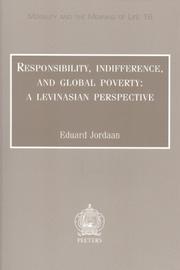| Listing 1 - 4 of 4 |
Sort by
|

ISBN: 0945257651 Year: 1995 Publisher: New York London Apex Press Zed Books Ltd.
Abstract | Keywords | Export | Availability | Bookmark
 Loading...
Loading...Choose an application
- Reference Manager
- EndNote
- RefWorks (Direct export to RefWorks)

ISBN: 0521527422 0521820421 0511817665 9780521820424 9780521527422 9780511817663 Year: 2004 Publisher: Cambridge : Cambridge university press,
Abstract | Keywords | Export | Availability | Bookmark
 Loading...
Loading...Choose an application
- Reference Manager
- EndNote
- RefWorks (Direct export to RefWorks)
As globalization has deepened worldwide economic integration, moral and political philosophers have become increasingly concerned to assess duties to help needy people in foreign countries. The essays in this volume present ideas on this important topic by authors who are leading figures in these debates. At issue are both the political responsibility of governments of affluent countries to relieve poverty abroad and the personal responsibility of individuals to assist the distant needy. The wide-ranging arguments shed light on global distributive justice, human rights and their implementation, the varieties of community and the obligations they generate, and the moral relevance of distance. This provocative volume will interest scholars in ethics, political philosophy, political theory, international law and development economics, as well as policy makers, aid agencies, and general readers interested in the moral dimensions of poverty and affluence.
Basic needs --- Economic assistance --- Poverty --- Moral and ethical aspects --- Moral and ethical aspects. --- Arts and Humanities --- Philosophy --- Economic assistance - Moral and ethical aspects - Developing countries --- Basic needs - Moral and ethical aspects - Developing countries --- Poverty - Moral and ethical aspects --- Destitution --- Wealth --- Begging --- Poor --- Subsistence economy --- Necessities of life --- Needs, Basic --- Social ecology --- Economic rights --- Quality of life --- Social rights --- Economic aid --- Foreign aid program --- Foreign assistance --- Grants-in-aid, International --- International economic assistance --- International grants-in-aid --- Economic policy --- International economic relations --- Conditionality (International relations)

ISBN: 9042918225 9789042918221 Year: 2006 Volume: 16 Publisher: Leuven: Peeters,
Abstract | Keywords | Export | Availability | Bookmark
 Loading...
Loading...Choose an application
- Reference Manager
- EndNote
- RefWorks (Direct export to RefWorks)
Consider the fact that thousands of people die daily from preventable, poverty-related causes through no fault of their own. However, despite our failure to prevent more of these preventable deaths, we generally do not seem to consider ourselves particularly guilty, unjust, bad, immoral or irresponsible for our failure to act. This study attempts to understand our continued good conscience amid the suffering of the world's poorest. In doing so, it draws on Emmanuel Levinas's ethical philosophy to demonstrate how writings in the principal debate about the extent of our responsibility for others at the global level, the so-called 'cosmopolitan-communitarian debate', contain a number of elements that enable and perpetuate our indifference to the world's poorest.
Political philosophy. Social philosophy --- General ethics --- Levinas, Emmanuel --- Accountability --- Apathie --- Apathy --- Impassivity --- Indiffence --- Justice sociale --- Lusteloosheid --- Moral responsibility --- Obligation --- Rechtvaardigheid [Sociale ] --- Responsabilité --- Responsibility --- Social justice --- Sociale rechtvaardigheid --- Unconcern --- Verantwoordelijkheid --- Obligation morale --- Responsabilité (Morale) --- Responsabilité (Philosophie) --- Responsabilité -- Aspect moral --- Responsabilité -- Philosophie --- Responsabilité morale --- Economic assistance --- Poverty --- Economic aid --- Foreign aid program --- Foreign assistance --- Grants-in-aid, International --- International economic assistance --- International grants-in-aid --- Economic policy --- International economic relations --- Conditionality (International relations) --- Indifference --- Emotions --- Equality --- Justice --- Ethics --- Supererogation --- Destitution --- Wealth --- Basic needs --- Begging --- Poor --- Subsistence economy --- Moral and ethical aspects --- Lévinas, Emmanuel. --- Lévinas, Emmanuel. --- Lévinas, E. --- Leṿinas, ʻImanuʼel --- Levinas, Emani︠u︡el --- לוינס׳ עמנואל --- לוינס, עמנואל --- Līfīnās, Īmānwāl --- ليفيناس، إيمانوال --- Lévinas, Emmanuel --- Responsibility. --- Apathy. --- Moral and ethical aspects. --- Lévinas, Emmanuel, --- Poverty - Moral and ethical aspects. --- Economic assistance - Moral and ethical aspects --- Lévinas, Emmanuel, - 1906-1995

ISBN: 0415069246 0415069254 9780415069250 9780415069243 Year: 1992 Publisher: London: Routledge,
Abstract | Keywords | Export | Availability | Bookmark
 Loading...
Loading...Choose an application
- Reference Manager
- EndNote
- RefWorks (Direct export to RefWorks)
Justice sociale --- Rechtvaardigheid [Sociale ] --- Social justice --- Sociale rechtvaardigheid --- Economic development --- International economic relations --- Economic assistance --- Moral and ethical aspects --- Environmental aspects --- 327.01 --- -Economic development --- -International economic relations --- -Economic assistance --- -#SBIB:327.4H10 --- Economic aid --- Foreign aid program --- Foreign assistance --- Grants-in-aid, International --- International economic assistance --- International grants-in-aid --- Economic policy --- Conditionality (International relations) --- Economic policy, Foreign --- Economic relations, Foreign --- Economics, International --- Foreign economic policy --- Foreign economic relations --- Interdependence of nations --- International economic policy --- International economics --- New international economic order --- International relations --- Economic sanctions --- Development, Economic --- Economic growth --- Growth, Economic --- Economics --- Statics and dynamics (Social sciences) --- Development economics --- Resource curse --- Equality --- Justice --- Internationale betrekkingen --(theorie) --- Developing countries --- -Moral and ethical aspects --- Ontwikkelingsproblematiek: algemeen --- Social justice. --- Environmental aspects. --- Moral and ethical aspects. --- 327.01 Internationale betrekkingen --(theorie) --- #SBIB:327.4H10 --- Eco-development --- Ecodevelopment --- Moral and religious aspects --- Economic development - Moral and ethical aspects. --- Economic development - Environmental aspects. --- International economic relations - Moral and ethical aspects. --- Economic assistance - Developing countries - Moral and ethical aspects. --- Economic development - Moral and ethical aspects --- Economic development - Environmental aspects --- International economic relations - Moral and ethical aspects --- Economic assistance - Moral and ethical aspects - Developing countries
| Listing 1 - 4 of 4 |
Sort by
|

 Search
Search Feedback
Feedback About UniCat
About UniCat  Help
Help News
News